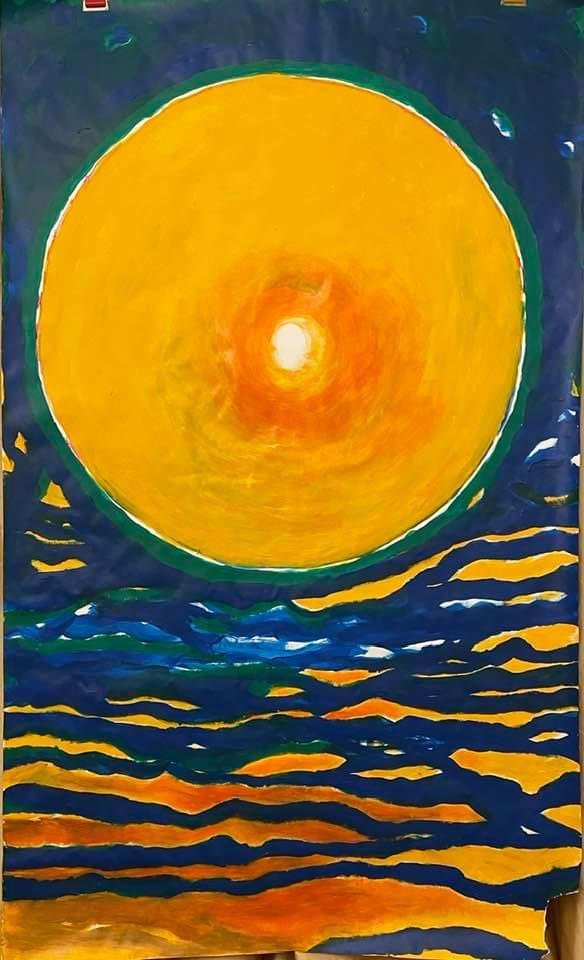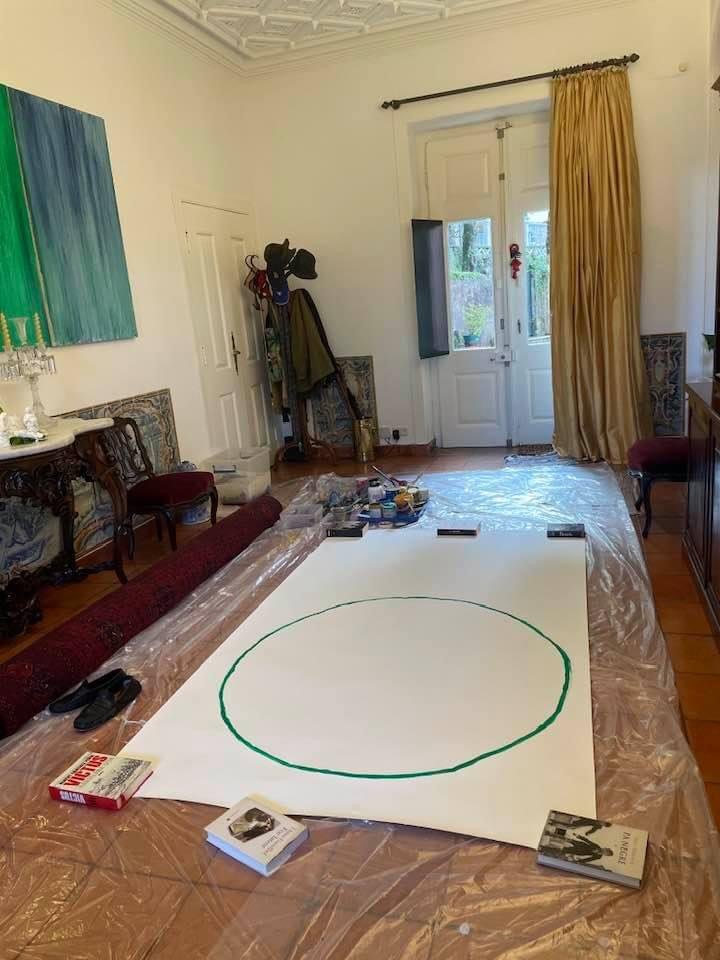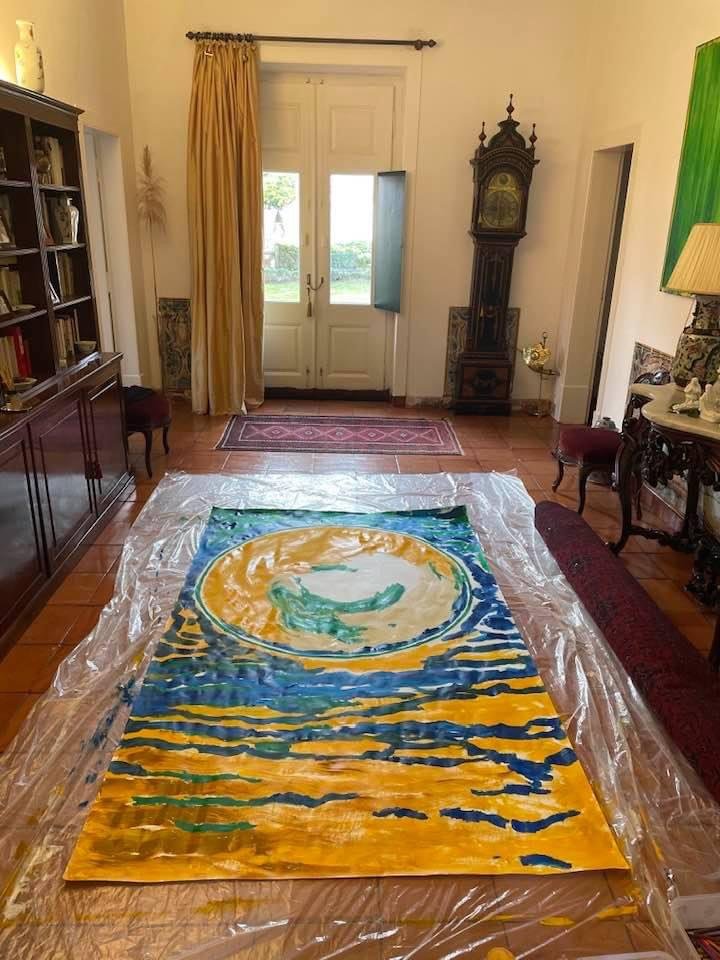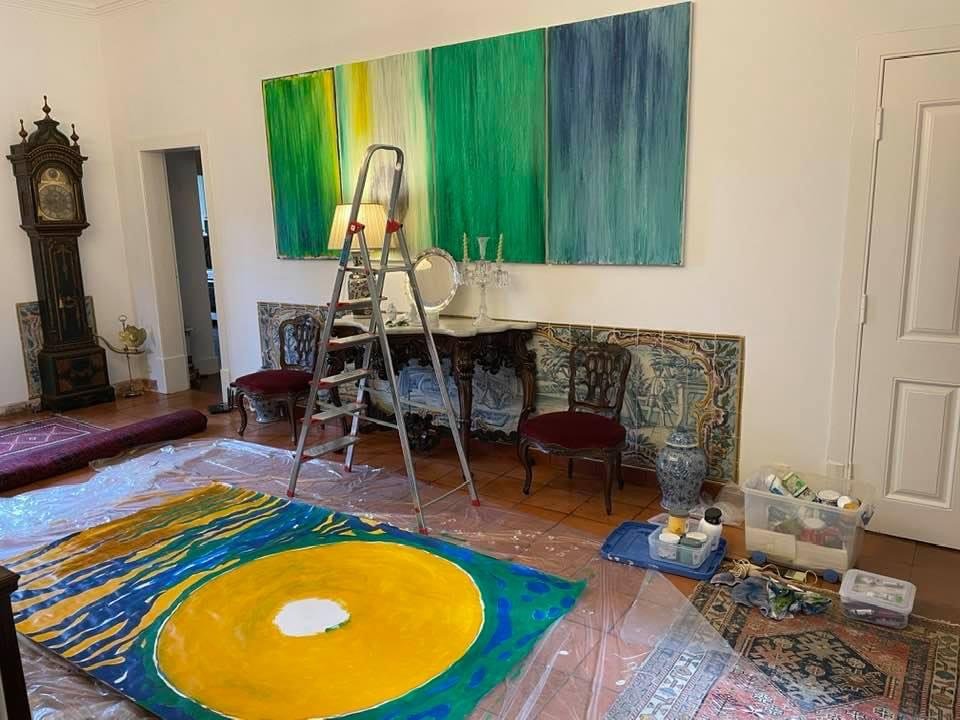“ECLIPSE 11/11: L'Espoir, malgré tout", pour Albert Camus (2020)
[Acrylic on paper - 250cmx 150]
"XI ECLIPSES SERIES", by Kasimir de Dalmau
When I celebrated my exhibition "Tattoos under skin" in February 2020 in Barcelona, I explained to all those who visited it, that the last painting I had done was the one entitled "Eclipse 1/11 - Desolation”, dedicated to my admired painter Joan Mitchell and which aims to express what I consider a progressive distancing of Man from himself and his natural environment. It is an acrylic painting on paper, large format [250cm x 150]. I also made it known that that painting was the announcement of an upcoming exhibition of mine, which would consist of 11 (the most perfect of prime numbers) eclipses, that one and 10 more, which I would elaborate over the course of the following months in my atelier in Sintra.
And I painted successive eclipses to complete the projected series, with the same technique and identical format than the first one. I had had the idea in my head for many months, entangled during confinement, and I had to get it out somehow. Ideas often fade away, fortunately, but when they persist, you need to give them an outlet, beyond success and outcome, if only for reasons of mental hygiene.
To better contextualize this series, I allow myself to recall below the technical definition of what an eclipse is, and at the same time add a more personal approach. I am mainly interested in this astronomical phenomenon in a figurative sense, the increasingly intense and dark eclipse of cultural (social), moral (spiritual) and environmental (ecological) values, a phenomenon that we can observe in a large part of contemporary societies.
According to the dictionary (Wikipedia), an eclipse is an astronomical phenomenon that occurs when one celestial object moves through the shadow of another. It is a type of Syzygia, that is, the alignment of three or more stars. The term derives from the ancient Greek noun ἔκλειψις (ékleipsis), which derives from the verb ἐκλείπω (ekleípō), "to cease to exist", combination of the prefix εκ- (ek-), the preposition εκ, εκ (ek, ex), "out", and from the verb λείπω (leípō), "being absent". The term is mainly used to describe either a solar eclipse, when the shadow of the Moon falls on the surface of the Earth, or a lunar eclipse, when the shadow of the Earth falls on the surface of the Moon. However, it can also refer to phenomena external to the Earth-Moon system: for example, a planet moving in the shadow cast by one of its Moons, a Moon moving in the shadow cast by its planet father, or a moon passing through the shadow of another moon.
In a figurative sense we can also speak of eclipse when the shadow cast by the "establishment", understood as a set of institutions, interest groups and factual powers, with the gregarious complicity and accommodation of broad social sectors, prevents us from visualizing and assume full awareness of the ecological/environmental degradation, social/cultural devastation or moral/spiritual desolation that a significant part of global society is suffering from today. In other words: the Man who distances from himself, from his own Consciousness and who renounces his Spirituality; the Man who breaks his bonds with Nature; and the Man who renounces his ability to transform reality through Culture.
In short, the eclipse as a phenomenon that prevents us from seeing what cannot be seen, but which exists and is happening. Do we adopt a critical attitude towards the current situation and rebel against it in an active, constructive, and determined way, or do we become co-responsible for it, either by interest (actively) or by inertia (passively)? That's the question. In the meantime I will be thinking about how, when and where to hold the exhibition on the "XI ECLIPSES"...
"SERIE XI ECLIPSES", by Kasimir de Dalmau
Quan vaig celebrar la meva exposició "Tattoos under skin" el mes de febrer de 2020 a Barcelona, vaig explicar a tots aquells que la vàren visitar, que la última pintura que havia fet era la que portava per títol “Eclipsi 1/11 - Desolació”, dedicada a la meva admirada pintora Joan Mitchell i que pretén expressar el que considero un allunyament progressiu de l'Home de sí mateix i del seu entorn natural. Es tracta d'una pintura acrílica sobre paper, de gran format [250 x 150 cm]. Vaig fer saber també que aquella pintura era l'anunci de la meva pròxima exposició, que consistiria en 11 (el més perfecte dels nombres primers) eclipsis, aquell i 10 més, que elaboraria en el transcurs dels mesos següents, en el meu atelier a Sintra.
Doncs bé, això és el que vaig començar a fer l'estiu passat en el meu atelier de Sintra i que ara he acabat (desembre 2020/gener 2021): pintar successius eclipsis fins completar la sèrie projectada, amb la mateixa tècnica i idèntic format que el primer. Portava ja molts mesos amb la idea al cap, enquistada durant el confinament, i me l'havia de treure com fòs. Les idees sovint s'esfumen, afortunadament, però quan persisteixen, cal donar-lis sortida, més enllà de l'encert i del resultat, encara que només sigui per una qüestió d'higiene mental.
Per acabar de contextualitzar millor aquesta sèrie em permeto recordar tot seguit la definició tècnica del que és un eclipsi, i alhora hi afegeixo una aproximació més personal. A mi m'interessa principalment aquest fenòmen astronòmic en sentit figurat, és a dir l'eclipsi cada cop més intens i fosc dels valors culturals (socials), morals (espirituals) i mediambientals (ecològics), fenòmen que podem observar en gran part de les societats contemporànies. Segons el diccionari (Wilkipedia), un eclipsi és un fenomen astronòmic que es produeix quan un objecte celestial es mou a través de l'ombra d'un altre. És un tipus de Sizígia, és a dir, l'alineació de tres o més astres. El terme deriva del substantiu del grec antic ἔκλειψις (ékleipsis), que deriva del verb ἐκλείπω (ekleípō), "deixar d'existir", combinació del prefix εκ- (ek-), de la preposició εκ, εξ (ek, ex), "fora", i del verb λείπω (leípō), "ésser absent". El terme és usat principalment per descriure o bé un eclipsi solar, quan l'ombra de la Lluna cau sobre la superfície de la Terra, o un eclipsi de Lluna, quan l'ombra de la Terra cau sobre la superfície de la Lluna. De totes maneres, es pot referir també a fenòmens externs al sistema Terra-Lluna: per exemple, un planeta movent-se en l'ombra projectada per una de les seves Llunes, una Lluna movent-se en l'ombra projectada pel seu planeta pare, o una lluna passant per l'ombra d'una altra lluna.
En sentit figurat també podem parlar d'eclipsi quan l'ombre projectada pel "stablishment", entès com a conjunt d’institucions, grups d’interès o poders fàctics, amb la complicitat gregària i acomodatícia d'amplis sectors socials, ens impedeix visualitzar i assumir plena consciència de la degradació ecològica/mediambiental, la devastació social/cultural o la desolació moral/espiritual que pateix una part important de la societat global actual. En d'altres paraules: l'Home que s'allunya d'ell mateix, de la seva pròpia Consciència i que renuncia a la seva Espiritualitat; l'Home que trenca els seus lligams amb la Natura; i l'Home que renuncia a la seva capacitat de transformar la realitat a través de la Cultura.
En definitiva, l'eclipsi com a fenòmen que ens impedeix veure allò que no es veu, però que existeix i està passant. Adoptem una actitut crítica envers l'estat actual de les coses i ens hi revoltem de manera activa, constructiva i determinada, o ens en fem co-responsables, ja sigui per interés (activament) o per inèrcia (passivament)? Aquesta és la questió. Mentrestant, continuaré pensant com, quan i on celebrar l'exposició sobre "XI ECLIPSIS"....
[Acrylic on paper - 250cmx 150]
"XI ECLIPSES SERIES", by Kasimir de Dalmau
When I celebrated my exhibition "Tattoos under skin" in February 2020 in Barcelona, I explained to all those who visited it, that the last painting I had done was the one entitled "Eclipse 1/11 - Desolation”, dedicated to my admired painter Joan Mitchell and which aims to express what I consider a progressive distancing of Man from himself and his natural environment. It is an acrylic painting on paper, large format [250cm x 150]. I also made it known that that painting was the announcement of an upcoming exhibition of mine, which would consist of 11 (the most perfect of prime numbers) eclipses, that one and 10 more, which I would elaborate over the course of the following months in my atelier in Sintra.
And I painted successive eclipses to complete the projected series, with the same technique and identical format than the first one. I had had the idea in my head for many months, entangled during confinement, and I had to get it out somehow. Ideas often fade away, fortunately, but when they persist, you need to give them an outlet, beyond success and outcome, if only for reasons of mental hygiene.
To better contextualize this series, I allow myself to recall below the technical definition of what an eclipse is, and at the same time add a more personal approach. I am mainly interested in this astronomical phenomenon in a figurative sense, the increasingly intense and dark eclipse of cultural (social), moral (spiritual) and environmental (ecological) values, a phenomenon that we can observe in a large part of contemporary societies.
According to the dictionary (Wikipedia), an eclipse is an astronomical phenomenon that occurs when one celestial object moves through the shadow of another. It is a type of Syzygia, that is, the alignment of three or more stars. The term derives from the ancient Greek noun ἔκλειψις (ékleipsis), which derives from the verb ἐκλείπω (ekleípō), "to cease to exist", combination of the prefix εκ- (ek-), the preposition εκ, εκ (ek, ex), "out", and from the verb λείπω (leípō), "being absent". The term is mainly used to describe either a solar eclipse, when the shadow of the Moon falls on the surface of the Earth, or a lunar eclipse, when the shadow of the Earth falls on the surface of the Moon. However, it can also refer to phenomena external to the Earth-Moon system: for example, a planet moving in the shadow cast by one of its Moons, a Moon moving in the shadow cast by its planet father, or a moon passing through the shadow of another moon.
In a figurative sense we can also speak of eclipse when the shadow cast by the "establishment", understood as a set of institutions, interest groups and factual powers, with the gregarious complicity and accommodation of broad social sectors, prevents us from visualizing and assume full awareness of the ecological/environmental degradation, social/cultural devastation or moral/spiritual desolation that a significant part of global society is suffering from today. In other words: the Man who distances from himself, from his own Consciousness and who renounces his Spirituality; the Man who breaks his bonds with Nature; and the Man who renounces his ability to transform reality through Culture.
In short, the eclipse as a phenomenon that prevents us from seeing what cannot be seen, but which exists and is happening. Do we adopt a critical attitude towards the current situation and rebel against it in an active, constructive, and determined way, or do we become co-responsible for it, either by interest (actively) or by inertia (passively)? That's the question. In the meantime I will be thinking about how, when and where to hold the exhibition on the "XI ECLIPSES"...
"SERIE XI ECLIPSES", by Kasimir de Dalmau
Quan vaig celebrar la meva exposició "Tattoos under skin" el mes de febrer de 2020 a Barcelona, vaig explicar a tots aquells que la vàren visitar, que la última pintura que havia fet era la que portava per títol “Eclipsi 1/11 - Desolació”, dedicada a la meva admirada pintora Joan Mitchell i que pretén expressar el que considero un allunyament progressiu de l'Home de sí mateix i del seu entorn natural. Es tracta d'una pintura acrílica sobre paper, de gran format [250 x 150 cm]. Vaig fer saber també que aquella pintura era l'anunci de la meva pròxima exposició, que consistiria en 11 (el més perfecte dels nombres primers) eclipsis, aquell i 10 més, que elaboraria en el transcurs dels mesos següents, en el meu atelier a Sintra.
Doncs bé, això és el que vaig començar a fer l'estiu passat en el meu atelier de Sintra i que ara he acabat (desembre 2020/gener 2021): pintar successius eclipsis fins completar la sèrie projectada, amb la mateixa tècnica i idèntic format que el primer. Portava ja molts mesos amb la idea al cap, enquistada durant el confinament, i me l'havia de treure com fòs. Les idees sovint s'esfumen, afortunadament, però quan persisteixen, cal donar-lis sortida, més enllà de l'encert i del resultat, encara que només sigui per una qüestió d'higiene mental.
Per acabar de contextualitzar millor aquesta sèrie em permeto recordar tot seguit la definició tècnica del que és un eclipsi, i alhora hi afegeixo una aproximació més personal. A mi m'interessa principalment aquest fenòmen astronòmic en sentit figurat, és a dir l'eclipsi cada cop més intens i fosc dels valors culturals (socials), morals (espirituals) i mediambientals (ecològics), fenòmen que podem observar en gran part de les societats contemporànies. Segons el diccionari (Wilkipedia), un eclipsi és un fenomen astronòmic que es produeix quan un objecte celestial es mou a través de l'ombra d'un altre. És un tipus de Sizígia, és a dir, l'alineació de tres o més astres. El terme deriva del substantiu del grec antic ἔκλειψις (ékleipsis), que deriva del verb ἐκλείπω (ekleípō), "deixar d'existir", combinació del prefix εκ- (ek-), de la preposició εκ, εξ (ek, ex), "fora", i del verb λείπω (leípō), "ésser absent". El terme és usat principalment per descriure o bé un eclipsi solar, quan l'ombra de la Lluna cau sobre la superfície de la Terra, o un eclipsi de Lluna, quan l'ombra de la Terra cau sobre la superfície de la Lluna. De totes maneres, es pot referir també a fenòmens externs al sistema Terra-Lluna: per exemple, un planeta movent-se en l'ombra projectada per una de les seves Llunes, una Lluna movent-se en l'ombra projectada pel seu planeta pare, o una lluna passant per l'ombra d'una altra lluna.
En sentit figurat també podem parlar d'eclipsi quan l'ombre projectada pel "stablishment", entès com a conjunt d’institucions, grups d’interès o poders fàctics, amb la complicitat gregària i acomodatícia d'amplis sectors socials, ens impedeix visualitzar i assumir plena consciència de la degradació ecològica/mediambiental, la devastació social/cultural o la desolació moral/espiritual que pateix una part important de la societat global actual. En d'altres paraules: l'Home que s'allunya d'ell mateix, de la seva pròpia Consciència i que renuncia a la seva Espiritualitat; l'Home que trenca els seus lligams amb la Natura; i l'Home que renuncia a la seva capacitat de transformar la realitat a través de la Cultura.
En definitiva, l'eclipsi com a fenòmen que ens impedeix veure allò que no es veu, però que existeix i està passant. Adoptem una actitut crítica envers l'estat actual de les coses i ens hi revoltem de manera activa, constructiva i determinada, o ens en fem co-responsables, ja sigui per interés (activament) o per inèrcia (passivament)? Aquesta és la questió. Mentrestant, continuaré pensant com, quan i on celebrar l'exposició sobre "XI ECLIPSIS"....
[Acrylic on paper - 250cmx 150]
"XI ECLIPSES SERIES", by Kasimir de Dalmau
When I celebrated my exhibition "Tattoos under skin" in February 2020 in Barcelona, I explained to all those who visited it, that the last painting I had done was the one entitled "Eclipse 1/11 - Desolation”, dedicated to my admired painter Joan Mitchell and which aims to express what I consider a progressive distancing of Man from himself and his natural environment. It is an acrylic painting on paper, large format [250cm x 150]. I also made it known that that painting was the announcement of an upcoming exhibition of mine, which would consist of 11 (the most perfect of prime numbers) eclipses, that one and 10 more, which I would elaborate over the course of the following months in my atelier in Sintra.
And I painted successive eclipses to complete the projected series, with the same technique and identical format than the first one. I had had the idea in my head for many months, entangled during confinement, and I had to get it out somehow. Ideas often fade away, fortunately, but when they persist, you need to give them an outlet, beyond success and outcome, if only for reasons of mental hygiene.
To better contextualize this series, I allow myself to recall below the technical definition of what an eclipse is, and at the same time add a more personal approach. I am mainly interested in this astronomical phenomenon in a figurative sense, the increasingly intense and dark eclipse of cultural (social), moral (spiritual) and environmental (ecological) values, a phenomenon that we can observe in a large part of contemporary societies.
According to the dictionary (Wikipedia), an eclipse is an astronomical phenomenon that occurs when one celestial object moves through the shadow of another. It is a type of Syzygia, that is, the alignment of three or more stars. The term derives from the ancient Greek noun ἔκλειψις (ékleipsis), which derives from the verb ἐκλείπω (ekleípō), "to cease to exist", combination of the prefix εκ- (ek-), the preposition εκ, εκ (ek, ex), "out", and from the verb λείπω (leípō), "being absent". The term is mainly used to describe either a solar eclipse, when the shadow of the Moon falls on the surface of the Earth, or a lunar eclipse, when the shadow of the Earth falls on the surface of the Moon. However, it can also refer to phenomena external to the Earth-Moon system: for example, a planet moving in the shadow cast by one of its Moons, a Moon moving in the shadow cast by its planet father, or a moon passing through the shadow of another moon.
In a figurative sense we can also speak of eclipse when the shadow cast by the "establishment", understood as a set of institutions, interest groups and factual powers, with the gregarious complicity and accommodation of broad social sectors, prevents us from visualizing and assume full awareness of the ecological/environmental degradation, social/cultural devastation or moral/spiritual desolation that a significant part of global society is suffering from today. In other words: the Man who distances from himself, from his own Consciousness and who renounces his Spirituality; the Man who breaks his bonds with Nature; and the Man who renounces his ability to transform reality through Culture.
In short, the eclipse as a phenomenon that prevents us from seeing what cannot be seen, but which exists and is happening. Do we adopt a critical attitude towards the current situation and rebel against it in an active, constructive, and determined way, or do we become co-responsible for it, either by interest (actively) or by inertia (passively)? That's the question. In the meantime I will be thinking about how, when and where to hold the exhibition on the "XI ECLIPSES"...
"SERIE XI ECLIPSES", by Kasimir de Dalmau
Quan vaig celebrar la meva exposició "Tattoos under skin" el mes de febrer de 2020 a Barcelona, vaig explicar a tots aquells que la vàren visitar, que la última pintura que havia fet era la que portava per títol “Eclipsi 1/11 - Desolació”, dedicada a la meva admirada pintora Joan Mitchell i que pretén expressar el que considero un allunyament progressiu de l'Home de sí mateix i del seu entorn natural. Es tracta d'una pintura acrílica sobre paper, de gran format [250 x 150 cm]. Vaig fer saber també que aquella pintura era l'anunci de la meva pròxima exposició, que consistiria en 11 (el més perfecte dels nombres primers) eclipsis, aquell i 10 més, que elaboraria en el transcurs dels mesos següents, en el meu atelier a Sintra.
Doncs bé, això és el que vaig començar a fer l'estiu passat en el meu atelier de Sintra i que ara he acabat (desembre 2020/gener 2021): pintar successius eclipsis fins completar la sèrie projectada, amb la mateixa tècnica i idèntic format que el primer. Portava ja molts mesos amb la idea al cap, enquistada durant el confinament, i me l'havia de treure com fòs. Les idees sovint s'esfumen, afortunadament, però quan persisteixen, cal donar-lis sortida, més enllà de l'encert i del resultat, encara que només sigui per una qüestió d'higiene mental.
Per acabar de contextualitzar millor aquesta sèrie em permeto recordar tot seguit la definició tècnica del que és un eclipsi, i alhora hi afegeixo una aproximació més personal. A mi m'interessa principalment aquest fenòmen astronòmic en sentit figurat, és a dir l'eclipsi cada cop més intens i fosc dels valors culturals (socials), morals (espirituals) i mediambientals (ecològics), fenòmen que podem observar en gran part de les societats contemporànies. Segons el diccionari (Wilkipedia), un eclipsi és un fenomen astronòmic que es produeix quan un objecte celestial es mou a través de l'ombra d'un altre. És un tipus de Sizígia, és a dir, l'alineació de tres o més astres. El terme deriva del substantiu del grec antic ἔκλειψις (ékleipsis), que deriva del verb ἐκλείπω (ekleípō), "deixar d'existir", combinació del prefix εκ- (ek-), de la preposició εκ, εξ (ek, ex), "fora", i del verb λείπω (leípō), "ésser absent". El terme és usat principalment per descriure o bé un eclipsi solar, quan l'ombra de la Lluna cau sobre la superfície de la Terra, o un eclipsi de Lluna, quan l'ombra de la Terra cau sobre la superfície de la Lluna. De totes maneres, es pot referir també a fenòmens externs al sistema Terra-Lluna: per exemple, un planeta movent-se en l'ombra projectada per una de les seves Llunes, una Lluna movent-se en l'ombra projectada pel seu planeta pare, o una lluna passant per l'ombra d'una altra lluna.
En sentit figurat també podem parlar d'eclipsi quan l'ombre projectada pel "stablishment", entès com a conjunt d’institucions, grups d’interès o poders fàctics, amb la complicitat gregària i acomodatícia d'amplis sectors socials, ens impedeix visualitzar i assumir plena consciència de la degradació ecològica/mediambiental, la devastació social/cultural o la desolació moral/espiritual que pateix una part important de la societat global actual. En d'altres paraules: l'Home que s'allunya d'ell mateix, de la seva pròpia Consciència i que renuncia a la seva Espiritualitat; l'Home que trenca els seus lligams amb la Natura; i l'Home que renuncia a la seva capacitat de transformar la realitat a través de la Cultura.
En definitiva, l'eclipsi com a fenòmen que ens impedeix veure allò que no es veu, però que existeix i està passant. Adoptem una actitut crítica envers l'estat actual de les coses i ens hi revoltem de manera activa, constructiva i determinada, o ens en fem co-responsables, ja sigui per interés (activament) o per inèrcia (passivament)? Aquesta és la questió. Mentrestant, continuaré pensant com, quan i on celebrar l'exposició sobre "XI ECLIPSIS"....
"Tout le malheur des hommes vient de l'Espérance."
"L'Espoir, au contraire de ce qu'on croit, équivaut à la résignation. Et vivre, c'est ne pas se résigner."
"Là où il n'y a pas d'Espoir, nous devons l'inventer."
ALBERT CAMUS
"L'Espoir des hommes, c'est leur raison de vivre et de mourir". ANDRÉ MALRAUX
"L'Espoir, ce magma dégueulasse qui finit par tout emmerder". ANONYME XXIème siècle



